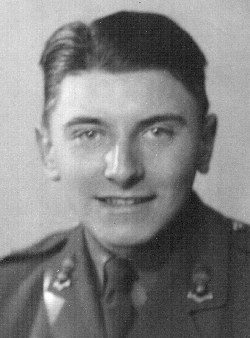Alan Corlett Woods

Born on 30th August 1922 at Sale, Cheshire (a suburb of Manchester). His family moved to live in North Wales when he was only three weeks old. It was there that he spent his boyhood and was educated. His father was an Englishman whose family was believed to be of Irish descent and his mother was a Manx.
His education was to be interrupted by the war. In 1940 he left school and entered Manchester University. In September 1941 he enlisted in the Army as a potential officer, though he was allowed to serve initially in the training corps attached to the university. Eventually he entered full-time service involving six months of rigorous training before he was commissioned as a second-lieutenant in 1942. Somewhat to his surprise, as he has no Scottish connections, he was posted to a Scottish regiment, the 75th (Highland) Field Regiment with whom he served for three years until he was released to continue with his university studies at the end of 1945.
Most of his service was overseas. He was in Tunisia for the closing stages of the fighting there. The regiment was then re-equipped with heavy guns and he spent a long period of training in Algeria before he embarked for Italy early in 1944. He fought in the final Battle of Cassino, took part in the quite rapid advance northwards via Rome and Florence until he wintered in the Apennines, only a few kilometres south of Imola. Early in 1945, they received orders to move the regiment to the Adriatic sector and they deployed their guns between Bagnacavallo and the River Senio, which formed the front line at that time. They were there for about a month before the final battle took place in April 1945. They were in support of the 78th British, 8th Indian, 6th British Armoured Divisions and an Italian Division, The Cremona Gruppo. They subsequently advanced via Alfonsine, Argenta and Ferrara before resting at Rovigo. There they heard the joyous news that the war in Europe had ended. A few days later they were given orders to move again to the border region near Trieste where Tito was posing problems. Alan went home on leave towards the close of 1945 and there received the welcome news that he was to be released from the Army in order to complete his university studies. He had been abroad for almost three years. By 1945 he had attained at 22 years of age the rank of captain and had been a good soldier. He was honoured by a “mention in despatches for distinguished service”.
In 1951 he married Margaret and they have two sons: Geoffrey and Jonathan and four delightful grandchildren. After teaching in two different grammar schools, he was appointed in 1959 to be Headmaster of Alleyne’s Grammar School (later High School) in Stone. After 24 year as headmaster there he retired in 1983. He then was asked to join the University of Keele as a part-time lecturer in the Education Department and there he remained for seven years.
Alan died in Stone in August 2007.
On December 21st 2004, 60th Anniversary of the Liberation of Bagnacavallo, Alan and John Thurlby received the Honorary Citizenship of Bagnacavallo. Alan wrote in his letter dated January 10th 2005: “These are exciting times for me in my “old age”. I am enormously proud of the honour your town has bestowed on me and on John. I cannot thank you enough for your part in it all.”


